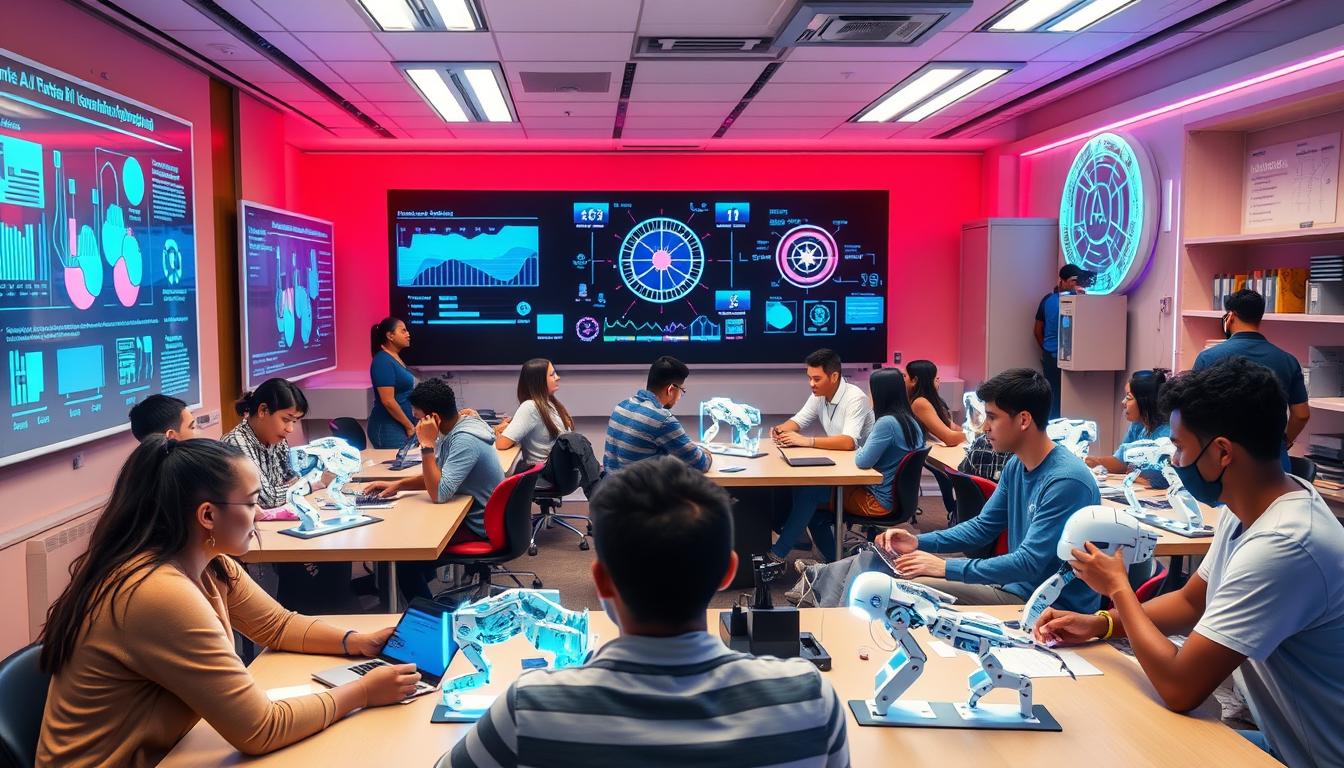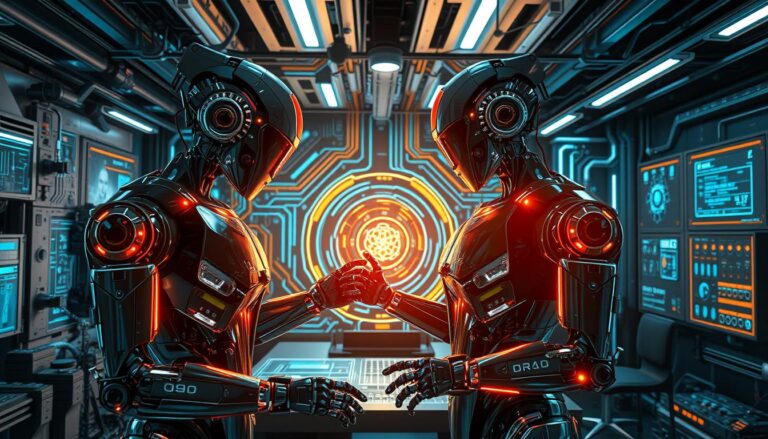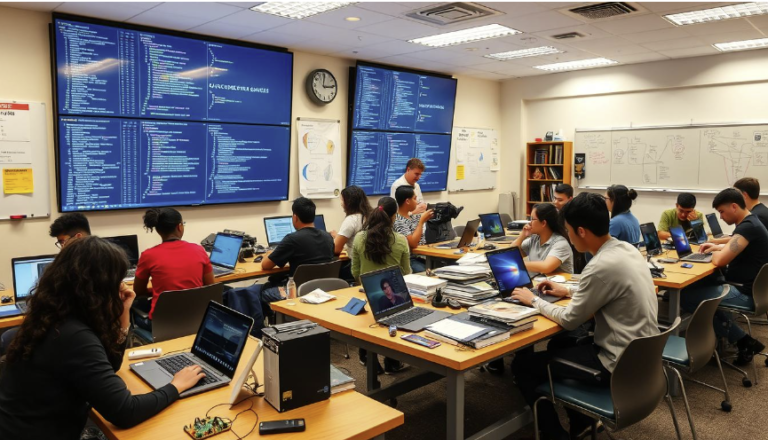Associate Degree in Artificial intelligence
Artificial Intelligence produces highly skilled graduates with technical expertise
Artificial Intelligence (AI) is changing the world fast. It’s making new rules in many industries and changing what skills are needed to succeed. Getting an Associate Degree in Artificial Intelligence is a great chance to learn the technical skills and problem-solving abilities that employers want.
This program teaches students about the basics, tools, and methods of AI. It’s designed to prepare students for the AI job market. With a solid education and practical experience, AI degree holders can make a big difference in the tech world.
Key Takeaways
- Acquire technical expertise in Artificial Intelligence, a transformative field that is reshaping industries
- Gain a comprehensive understanding of AI principles, tools, and techniques through a rigorous curriculum
- Develop problem-solving skills and the ability to implement AI-powered solutions
- Become a highly sought-after professional in the rapidly growing AI job market
- Unlock a wide range of career opportunities across diverse industries
The Rise of AI Education
Artificial intelligence (AI) is changing the world, from how we work to how we live. This change has made it crucial to have more people skilled in AI. Now, there’s a big need for graduates who know a lot about AI.
AI’s Growing Importance in Today’s Workforce
AI is key in many fields, like healthcare, finance, and even in making things. Companies worldwide are using AI to work better and stay ahead. This makes knowing about AI very important for jobs today.
The Demand for AI-Skilled Professionals
AI has made a big gap in skills, with jobs needing people who know about machine learning and more. A report says the need for AI experts will jump by over 70% soon. Schools need to make sure they’re teaching AI skills to meet this demand.
| Industry | AI Adoption Rate | Projected Growth |
|---|---|---|
| Healthcare | 43% | 80% |
| Finance | 35% | 65% |
| Manufacturing | 28% | 75% |
The table shows AI’s big role in industries like healthcare, finance, and manufacturing. These areas are leading in using AI and expecting more growth.
“The future of work is being shaped by the rapid advancement of artificial intelligence. Businesses that fail to invest in AI-skilled talent will struggle to remain competitive in today’s fast-paced, technology-driven landscape.”
Exploring an Associate Degree in Artificial Intelligence
The field of Artificial Intelligence (AI) is booming. An associate degree in AI is now a great choice for starting a career in this exciting field. This degree program teaches you the technical skills needed in AI.
An associate degree in AI covers a wide range of topics. You’ll learn about AI basics, algorithms, and how to apply them. The goal is to make sure you know the latest AI technologies and methods.
AI Education Options
Getting an AI degree program at the associate level is a rich experience. You’ll study machine learning, natural language processing, and more. You’ll also work on real projects and internships, putting your skills to the test.
| Course | Description |
|---|---|
| Introduction to Artificial Intelligence | Explores the fundamental concepts, history, and development of AI, including its various subfields and applications. |
| Machine Learning Algorithms | Covers the core machine learning algorithms, their implementation, and their applications in solving complex problems. |
| Data Visualization and Analytics | Focuses on the techniques and tools used to extract insights from large datasets, including data preprocessing, analysis, and presentation. |
By getting an associate degree in AI, you’ll build a strong foundation. This prepares you for entry-level jobs or further studies in AI.
Curriculum Highlights
The Associate Degree in Artificial Intelligence at our institution offers a comprehensive curriculum. It equips students with a deep understanding of AI principles, technologies, and applications. This program provides a solid foundation in AI core concepts and hands-on learning opportunities.
Core AI Courses
The core AI courses in the curriculum cover a wide range of topics, including:
- Fundamentals of Artificial Intelligence
- Machine Learning Algorithms and Techniques
- Natural Language Processing
- Computer Vision and Image Recognition
- Robotics and Automation
- Data Mining and Big Data Analytics
Hands-On Learning Opportunities
In addition to the core AI courses, the program offers numerous hands-on learning opportunities. These allow students to apply their knowledge and develop real-world skills. These include:
- Capstone projects, where students work on comprehensive AI-based solutions to address real-world challenges
- Internships and co-op placements at leading technology companies and research organizations
- Hackathons and coding competitions that encourage innovation and problem-solving
- Access to state-of-the-art AI laboratories and simulation environments
By combining theoretical knowledge with practical application, the AI degree curriculum ensures that graduates are well-equipped. They are ready to excel in the rapidly evolving AI course topics and hands-on AI learning environments.
“The hands-on learning opportunities in the AI program have been instrumental in shaping my practical skills and understanding of how AI can be applied to real-world problems.”
Career Prospects for AI Graduates
Graduates with an Associate Degree in Artificial Intelligence have many career options. The demand for AI skills is growing fast. This means many industries are looking for people with AI knowledge.
High-Growth Industries
AI graduates can find jobs in many exciting fields. Here are some examples:
- Technology and Software Development: AI graduates can help create new technologies and systems.
- Healthcare: AI is changing healthcare. AI experts can work on medical imaging and disease diagnosis.
- Financial Services: AI is making finance better. AI graduates can help with fraud detection and investment analysis.
- Retail and E-commerce: AI helps businesses improve customer service and supply chains.
- Manufacturing: AI makes factories more efficient. AI graduates can work on smart factories and predictive maintenance.
| Industry | AI-Related Job Opportunities |
|---|---|
| Technology and Software Development | Software Engineer, Data Scientist, Machine Learning Engineer, AI Architect |
| Healthcare | Clinical Data Analyst, Medical Imaging Specialist, Bioinformatics Scientist, Telehealth Coordinator |
| Financial Services | Quantitative Analyst, Algorithmic Trader, Fraud Detection Specialist, Wealth Management Advisor |
| Retail and E-commerce | Personalization Engineer, Inventory Optimization Analyst, Chatbot Developer, Supply Chain Planner |
| Manufacturing | Process Automation Engineer, Production Optimization Analyst, Predictive Maintenance Specialist, Quality Control Analyst |
AI is changing fast, and so are the job opportunities. AI graduates can make a big difference in many fields. These fields are growing and need skilled professionals.
Developing Technical Expertise
The Associate Degree in Artificial Intelligence focuses on giving students the technical skills they need. It prepares them for the fast-changing AI world. Students learn the latest AI tools and techniques and develop top-notch AI technical skills in demand today.
Mastering AI Tools and Techniques
The program’s curriculum covers the AI tools and techniques that are changing the industry. Students learn through hands-on projects. They get to work with advanced AI tools, such as:
- Machine Learning Frameworks (e.g., TensorFlow, PyTorch, Scikit-Learn)
- Natural Language Processing (NLP) Libraries (e.g., NLTK, Spacy, Transformers)
- Computer Vision Platforms (e.g., OpenCV, Keras, Pillow)
- Data Visualization and Analytical Tools (e.g., Matplotlib, Seaborn, Tableau)
Students also explore new AI techniques like deep learning and generative adversarial networks (GANs). They learn how to apply these in real-world scenarios.
By mastering these AI tools and techniques, students gain the AI technical skills to solve complex problems. They become innovators in the Artificial Intelligence field.
Benefits of an AI Associate Degree
Getting an Associate Degree in Artificial Intelligence can unlock many doors. It gives you a big advantage in the job market. This degree helps you move up in your career faster and stand out in the AI field.
Accelerated Career Path
An AI associate degree lets you start your career with the skills you need. You’ll learn in-demand skills and get hands-on experience. This means you can take on entry-level roles in AI with confidence.
You’ll be able to advance quickly because you can contribute right away. You’ll show employers your skills and abilities.
Competitive Edge in the Job Market
As AI jobs grow, an AI associate degree makes you stand out. Employers want people with AI knowledge and experience. This degree shows you’re dedicated and skilled, giving you a strong edge.
With an AI associate degree, you’re ready for roles in data analysis, machine learning, or AI software development. It’s a great start for a career in AI. You’ll be ready to take advantage of the many career opportunities in AI.
Choosing the Right AI Program
Starting your journey in artificial intelligence (AI) means picking the right degree program is key. There are many options, so it’s important to think about what you want to achieve. This guide will help you select an AI degree program that fits your goals.
Curriculum and Hands-On Learning
When looking at AI associate programs, check the curriculum closely. Look for programs that cover the basics of AI, like machine learning and natural language processing. Also, find programs that offer hands-on learning opportunities. This way, you can practice what you learn through projects and internships.
Faculty Expertise and Program Accreditation
The quality of the faculty is very important when selecting an AI degree program. Make sure the teachers are experts in AI and have real-world experience. Also, choose programs that are accredited by well-known organizations. This shows the program is high-quality and rigorous.
Aligning with Your Career Goals
When evaluating AI associate programs, think about your career goals. Look at the program’s focus on skills that are in demand. Also, check if the program has connections with the industry and good job placement rates. This ensures the program supports your career plans.
By considering these factors, you can select the AI degree program that meets your needs and goals. This will prepare you for a successful career in artificial intelligence.
“The future of artificial intelligence is not about building systems that can beat humans at specific tasks, but rather creating AI that can learn, adapt, and solve problems in ways that complement and augment human intelligence.” – Satya Nadella, CEO of Microsoft
Success Stories of AI Graduates
Earning an Associate Degree in Artificial Intelligence has led to amazing achievements for its graduates. They use their technical skills to make real changes in the world. This shows how powerful AI education can be.
Transforming Industries with AI Innovations
Emily Johnson, a recent AI graduate, now leads the data analytics team at a top healthcare organization. Her AI solutions have made patient data management better. This has greatly improved care and outcomes for patients.
Aiden Lee, another AI graduate, has made big strides in renewable energy. His AI systems help companies cut their carbon footprint. This supports sustainable energy efforts.
“The skills I gained through my AI degree have been instrumental in my ability to drive real change in my industry. The hands-on learning and industry-relevant curriculum truly prepared me for the challenges I face every day.”
– Aiden Lee, AI Graduate
Pioneering AI-Powered Advancements
- Samantha Patel, an AI graduate, has created a system that detects and diagnoses rare genetic disorders. This has greatly improved patient care.
- Juan Hernandez, a recent AI graduate, has developed AI-powered cybersecurity solutions. These protect businesses and organizations from cyber threats.
- Emily Chen, an AI graduate, has used her knowledge to make innovative AI-powered chatbots. These chatbots offer personalized customer service, improving the user experience for businesses.
These success stories highlight the significant impact AI graduates are making. They are driving innovation, boosting efficiency, and creating positive change in their fields.
The Future of AI Education
The field of artificial intelligence is growing fast. This means big changes in AI education. New degree programs and learning experiences are coming. They will help students get ready for the future and new job chances.
Trends in AI Degree Programs
More specialized AI degree programs are starting. Universities are now offering bachelor’s and master’s degrees in artificial intelligence. These programs give students the skills they need to succeed in AI.
Innovations in AI Learning
New ways of learning AI are also emerging. Schools are using the latest tech for better learning. This includes virtual simulations and projects with top AI tools.
- Integrating AI-powered adaptive learning platforms to personalize the educational journey
- Collaborating with tech giants and startups to offer real-world AI projects and internships
- Incorporating emerging technologies like augmented reality and machine learning into the curriculum
The future of AI education looks bright. With new programs and learning methods, students will get the skills they need. This will help them succeed in AI’s fast-changing world.
Conclusion
The Associate Degree in Artificial Intelligence is changing the game. It gives people the skills they need to succeed in the fast-paced AI world. This article showed how valuable an AI education is, with its wide range of career options and benefits.
One key point is how AI is becoming more important in jobs. An AI associate degree can really help you stand out. You’ll learn by doing and get to use the latest AI tools and techniques.
If you want a career that’s both exciting and in-demand, now is the time to look into an Associate Degree in Artificial Intelligence. This degree opens doors to many opportunities. It lets you use your skills to help shape the future of AI. Start your journey towards a rewarding career in Artificial Intelligence today.
FAQ
What is the focus of an Associate Degree in Artificial Intelligence?
An Associate Degree in Artificial Intelligence teaches students the skills needed for the AI-driven workforce. It prepares them for the fast-changing AI world.
How important is AI education in today’s workforce?
AI is changing many industries, making skilled AI workers more important than ever. AI education is key for workforce growth.
What are the key components of an AI degree program?
The Associate Degree in Artificial Intelligence has a detailed curriculum. It includes core AI courses and hands-on learning. This helps students gain practical skills in AI.
What career prospects are available for AI graduates?
AI graduates can find many exciting jobs in growing industries. These jobs need AI skills.
How does an AI degree program help develop technical expertise?
The Associate Degree in Artificial Intelligence focuses on technical skills. Students learn the latest AI tools and methods through practical training.
What are the key benefits of pursuing an AI associate degree?
An Associate Degree in Artificial Intelligence offers many benefits. It can speed up your career and give you a job market edge. It also lets you specialize in AI and stand out in the industry.
How can one choose the right AI degree program?
Choosing the right Associate Degree in Artificial Intelligence is important. Look at the program’s curriculum, faculty, hands-on learning, and accreditation. Make sure it fits your goals.
What are some success stories of AI graduates?
AI graduates have made a big impact in their fields. They’ve achieved great things and shown how their AI skills work in real life.
What are the emerging trends and innovations in AI education?
AI education is set to see new trends and innovations. These will include new learning methods and updated curricula. They’ll keep up with the fast-changing AI world.





